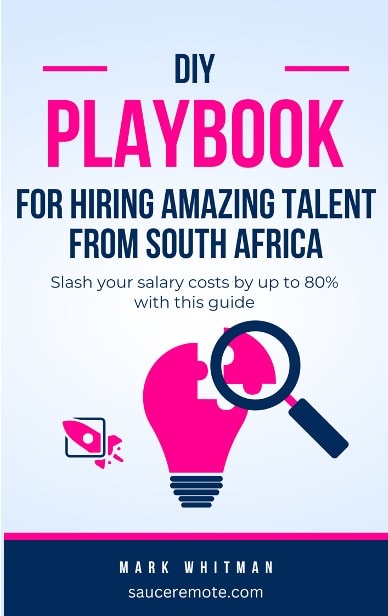Are you looking for PEO pros and cons? Good call!
Not knowing what you’re getting into when partnering with a professional employer organisation (PEO) can get you into deep trouble.
Join me as I dissect the pros and cons of working with a PEO.
Ready? Let’s roll.

Discover how to slash your salary costs by 80%
Get our exact process for hiring amazing overseas talent from South Africa. Includes copy-and-paste templates and a detailed salary guide.
PEO Pros and Cons: 9 Considerations
Let’s start with the good news.
Pro tip: Not sure what the difference between a PEO and EOR is? Check out my ultimate guide, where I pit PEO vs EOR.
5 PEO Advantages
Partnering with a PEO offers several benefits for businesses. Let’s look at how a PEO helps ease the HR burden.
1. Simplified HR Management
A PEO takes over many of the time-consuming HR tasks, such as payroll processing, benefits administration, and compliance management.
Why does this matter?
Because it frees up your team to focus on more strategic activities, like growing your business and supporting your employees.
2. Access to Better Benefits
Small and mid-sized businesses often struggle to provide competitive benefits packages.
A PEO can use its established pool of clients and contacts to negotiate better rates on health insurance, retirement plans, and other employee perks, making it easier for you to attract and retain top talent.
3. Compliance Help
While PEOs typically don’t handle setting up compliant employment contracts directly, they can guide you on how to hire staff in line with local laws and customs.
For instance, they might help you understand various types of paid leave, offer insights on salary benchmarking to ensure competitive pay and provide advice on minimising Permanent Establishment (PE) risk.
4. Cost Savings
By outsourcing HR functions to a PEO, you can reduce the overhead costs of maintaining an in-house HR department.
Plus, the PEO’s ability to secure better benefits rates can translate to significant savings for your company.
5. Reduced Employer Liability
Since the PEO shares the responsibility of being an employer, they also take on some liability.
This can provide additional protection for your business, particularly in areas like workers’ compensation and employment-related lawsuits.
However, while a PEO offers many advantages, an Employer of Record (EOR) might be a better fit for companies looking to expand internationally or those that need more flexibility in managing a global workforce.
An EOR, like Sauce, handles all legal employer responsibilities—something a PEO typically doesn’t offer.
Now, let’s discuss the disadvantages of working with a PEO.
Hire remote talent from South Africa & slash salary costs by 80%
Salaries start from £8,000 per year!
4 PEO Disadvantages
While a PEO can offer many benefits, there are some downsides you should be aware of.
1. Limited Control
When you partner with a PEO, you’re handing over a significant portion of your HR functions to a third party.
This can limit your control over certain HR operations, such as customising benefits packages or implementing specific HR policies that align with your company culture.
2. Shared Liability
While sharing liability with a PEO can be beneficial, it also means that you’re still on the hook for some legal responsibilities.
If the PEO makes a mistake, your business could still face fines or legal action, especially in areas like employment law and tax compliance.
3. One-Size-Fits-All Solutions
PEOs often provide standardised services, which might not be tailored to your company’s unique needs.
This can be a drawback if your business requires specialised HR support or has specific compliance requirements that a PEO’s standard offerings can’t fully address.
4. International Limitations
A PEO might not be the best fit if your company is looking to expand globally.
PEOs typically operate within specific countries, meaning they might not be able to support your international hiring needs.
In contrast, an EOR can manage employment for global teams without the need for local entities, offering more flexibility for international growth.
My Final Thoughts
Short and sweet. I shared 9 PEO pros and cons. While a PEO seems great, an even better option is to go with an EOR like Sauce. Are you ready to hire with Sauce? You won’t regret it.
